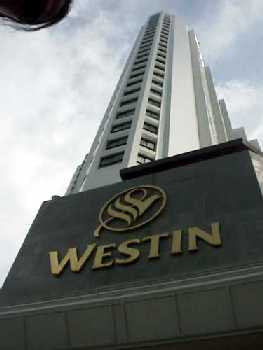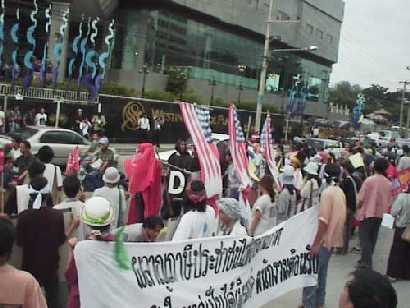

The Westin Hotel, where the Asian Development Bank held its Annual General meeting in this northern Thai city, resembled an armed camp. About 2,000 riot police guarded the delegates from about 1,200 protesters, mostly poor Thais who claim that bank-funded projects like dams have ruined their lives.
http://dailynews.yahoo.com/h/ap/20000508/wl/asian_bank_protests_1.html
Monday May 8 6:31 AM ET
By PATRICK McDOWELL, Associated Press Writer
CHIANG MAI, Thailand (AP) -
 The Asian Development Bank concluded a troubled annual meeting today, shrugging off U.S. complaints about its desire for more money and refusing to heed hundreds of protesters.
The Asian Development Bank concluded a troubled annual meeting today, shrugging off U.S. complaints about its desire for more money and refusing to heed hundreds of protesters.
The Westin Hotel, where the meeting was held in this northern Thai city, resembled an armed camp. About 2,000 riot police guarded the delegates from about 1,200 protesters, mostly poor Thais who claim that bank-funded projects like dams have ruined their lives.
Firetrucks with water cannons were on standby next to Mercedes-Benz cars and tour buses ferrying the delegates. The demonstrators, braving a scorching tropical sun, held up a banner reading “ADB equals BAD.”
The protesters had demanded that the bank meet their demands before the meeting adjourned: stop funding a huge wastewater treatment plant near the capital of Bangkok, and stop loans that increase indebtedness of poor nations or hurt farmers and the poor.
Bank President Tadao Chino, who said his schedule was “too hectic” to meet the protesters, sent a letter saying the bank would study their demands. The crowd burned it and dispersed peacefully today.
Today's tight security came after 4,000 people bulldozed through an outer perimeter of police barricades Sunday to take up positions outside the hotel. Brief pushing broke out, but there was no violence.
The protests, coupled with a U.S. refusal to consider spending more money on the bank, were the latest blows against multilateral economic institutions since the World Trade Organization's summit in Seattle last year put them under the spotlight.
Mindful of the unrest that derailed the WTO meeting, the U.S. government has shifted next year's Asian Development Bank gathering from its original venue in Seattle to Honolulu, Hawaii.
But in remarks Sunday, Edwin M. Truman, the U.S. Treasury Department's assistant secretary of international affairs, said that Washington would refuse bank requests to raise its capital.
Japan favors an increase. Japan and the United States each have a 13 percent stake in the bank, but Japan dominates it.
Truman said the bank should use existing money better and make loans more selectively, work better with the Washington-based World Bank in choosing projects, and allow more room for private-sector banks he said were “crowded out.”
Despite Truman's tough line, most of the bank's 58 board members chose to go ahead with a study to assess its resources and needs. The study is seen as the first step in making an undetermined capital increase.
The bank's mission is to reduce poverty in Asia, where it says some 900 million people live on less than $1 a day.
Critics say it relies too much on working with governments and big business and fails to consult with the people it is supposed to help.
The most significant accomplishment during the meeting was an agreement on the sidelines by 13 East Asian nations to come to the rescue of each other's currencies in the event of another 1997-style crisis.
Many details need filling in, but the step is seen as progress to increase Asian clout against the North American Free Trade Agreement and the European Union. The agreement covers Japan, China, South Korea and the 10 members of the Association of Southeast Asian Nations.
Chino did not say how much the three-day board of governors gathering cost, though officials repeatedly stated during the meeting that the Manila-based bank is seeking to become more transparent.
“We at the ADB welcome the challenge of change,” Chino told a final news conference.